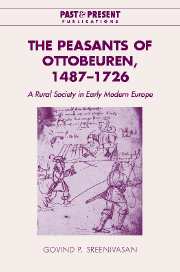Book contents
- Frontmatter
- Contents
- List of figures
- List of maps
- List of tables
- Acknowledgements
- Note on weights, measures, and currencies
- Map 1 Southern Germany, c. 1620
- Map 2 The lands of the monastery of Ottobeuren, 1620
- Introduction
- 1 Right and might (c. 1480–c. 1560)
- 2 The discrete society (c. 1480–c. 1560)
- 3 A crisis of numbers? (c. 1560–c. 1630)
- 4 Integrity and the market (c. 1560–c. 1630)
- 5 Living on borrowed time (c. 1560–c. 1630)
- 6 To empty and to refill (c. 1630–c. 1720)
- Conclusion
- Bibliography
- Index of places
- General index
- Past and Present Publications
5 - Living on borrowed time (c. 1560–c. 1630)
Published online by Cambridge University Press: 21 July 2009
- Frontmatter
- Contents
- List of figures
- List of maps
- List of tables
- Acknowledgements
- Note on weights, measures, and currencies
- Map 1 Southern Germany, c. 1620
- Map 2 The lands of the monastery of Ottobeuren, 1620
- Introduction
- 1 Right and might (c. 1480–c. 1560)
- 2 The discrete society (c. 1480–c. 1560)
- 3 A crisis of numbers? (c. 1560–c. 1630)
- 4 Integrity and the market (c. 1560–c. 1630)
- 5 Living on borrowed time (c. 1560–c. 1630)
- 6 To empty and to refill (c. 1630–c. 1720)
- Conclusion
- Bibliography
- Index of places
- General index
- Past and Present Publications
Summary
In the midwinter of 1616/17, Barbara Sontheimer of Dietratried married the widower Caspar Herz of Leupolz under less than ideal circumstances. She was not a virgin, he was landless, and no part of the story – including its eventual happy ending – makes sense outside the context of peasant inheritance practices.
Barbara's father, Melchior Sontheimer, had farmed 7 jauchert of land in Dietratried since the late 1570s. In the spring of 1614 he decided to retire, and, in keeping with the newer custom of impartibility, sold the entire property to his eldest son, Johann, for 200 gulden. Barbara Sontheimer and her sister, Maria, were now expected to leave home to work as servants elsewhere, retaining only the right to convalesce at the house if they came back sick from service. Johann also agreed to later provide meals for a cobbler, tailor, and seamstress to make his sisters' wedding clothes. The arrangement was clearly not to the sisters' liking, and a year later it was amended to allow them to remain at home “if they do not wish to go into service.” In that case, however, Barbara and Maria “shall [still] be obliged to feed themselves.” Johann was not going to support his sisters, who therefore had only two options: to remain at home and work as unmarried dependants, or to go into service against their will. Maria chose the former, and Barbara the latter, finding work in the village of Unterwesterheim in the home of the Bauer Hans Rauch.
- Type
- Chapter
- Information
- The Peasants of Ottobeuren, 1487–1726A Rural Society in Early Modern Europe, pp. 204 - 279Publisher: Cambridge University PressPrint publication year: 2004

